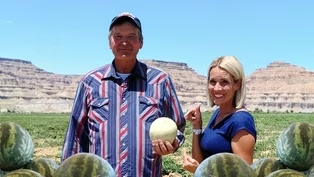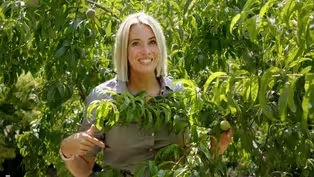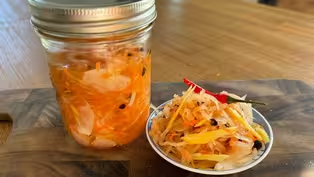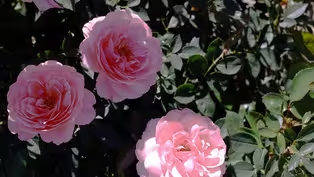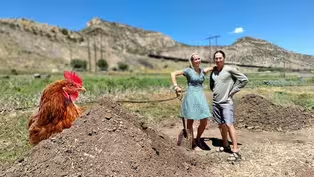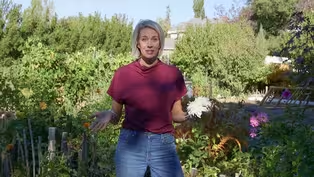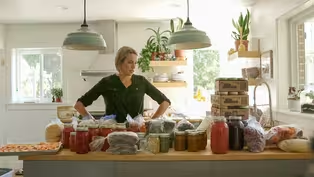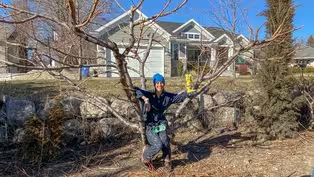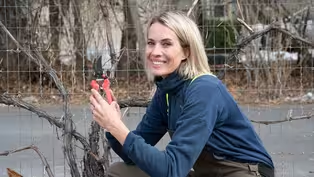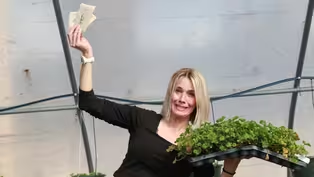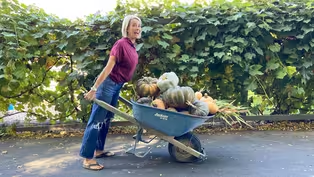Modern Gardener
Fungi in Your Garden
Episode 80 | 10m 32sVideo has Closed Captions
Learn more about the benefits of fungi in your soil.
While mushrooms might be the first thing you think of when you hear the word fungi, these organisms play an important role in the soil. Building complex networks below ground, fungi bring the soil to life and help our gardens bloom!
Problems playing video? | Closed Captioning Feedback
Problems playing video? | Closed Captioning Feedback
Modern Gardener is a local public television program presented by PBS Utah
Funding for Modern Gardener is made possible in part by Merit Medical and Red Butte Garden & Arboretum.
Modern Gardener
Fungi in Your Garden
Episode 80 | 10m 32sVideo has Closed Captions
While mushrooms might be the first thing you think of when you hear the word fungi, these organisms play an important role in the soil. Building complex networks below ground, fungi bring the soil to life and help our gardens bloom!
Problems playing video? | Closed Captioning Feedback
How to Watch Modern Gardener
Modern Gardener is available to stream on pbs.org and the free PBS App, available on iPhone, Apple TV, Android TV, Android smartphones, Amazon Fire TV, Amazon Fire Tablet, Roku, Samsung Smart TV, and Vizio.
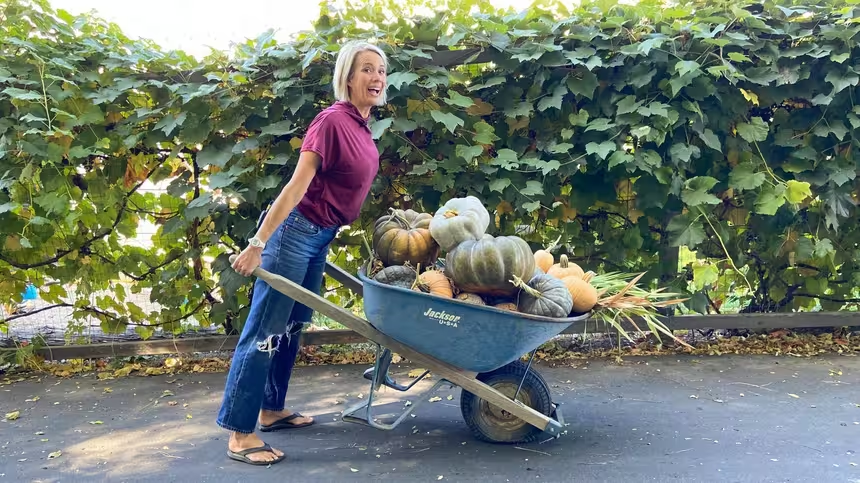
Modern Gardener
Subscribe to the Modern Gardener YouTube channel for more videos and information on gardening, and share your gardening tips and stories in the comments section. Can't wait to GROW with you!Providing Support for PBS.org
Learn Moreabout PBS online sponsorshipMore from This Collection
Fun ideas for garden projects! Make your own succulent wreath, garden box and more!
Everything to Know About Monarch Butterflies
Video has Closed Captions
Learn about one of North America’s most iconic species and the challenges facing it. (11m 34s)
If you want sweet, delicious fruit, then thinning your tree is a must. (3m 45s)
Can Roses Save Water and Clean the Air?
Video has Closed Captions
Flipping your strip with roses. (7m 8s)
Composting with Chickens and Beer
Video has Closed Captions
Learn how to compost with chicken tractors and spent beer grains! (7m 22s)
What's Happening in My Garden in October?
Video has Closed Captions
Here's what's going on in my garden during the month of October. (2m 19s)
Video has Closed Captions
August means you're living in the harvest! (4m 44s)
Video has Closed Captions
We show you how to properly prune a peach tree for great peaches and a healthy tree. (10m 8s)
Video has Closed Captions
We take you through the process of pruning grape vines. (8m 34s)
Seeds vs Starts: The Pros and Cons
Video has Closed Captions
Useful tips and information to consider when deciding to starting from seed or buy starts (8m 17s)
Providing Support for PBS.org
Learn Moreabout PBS online sponsorship(gentle music) - If we look at a natural ecosystem it's very self-sustaining.
No one tills the forest, no one adds chemicals or fertilizers to the forest, and yet it's able to sustain itself for thousands of years in a lot of cases.
And that is due, in large part to the work that fungi do.
(upbeat music) So the question for us, as people who grow food, then becomes, how can we mimic that to make our own farms or gardens be more in tune with what nature is doing?
(upbeat music) - When you hear fungus in the garden, most gardeners wince, but fungus is actually a really good thing.
We're here with Katie Lawson, of Fungal Focus, to learn more about how you can support these powerhouses in your own garden.
And if you like this video give us a thumbs up and hit that subscribe button.
(gentle music) - Fungi are a whole kingdom or a whole queendom.
Mushrooms tend to be what people are familiar with but there are all types of fungi, most of which actually don't form a mushroom, but all of which are beneficial to natural ecosystems and potentially our gardens and farms as well.
- So what are the main ways that gardeners can support fungi in their soil?
- I think the first step would just be to change our mindset and accept that fungi are good and beneficial and meant to be here.
And then we can start to think of ourselves as farmers of the microbiology.
Farmers of living soil and then the soil will produce good plants for us.
- I love that.
That's awesome, to start with the soil.
So what are some ways gardeners can start to support their soil and build their soil up?
- A couple easy things we could do right off the bat would be to stop tilling, to be aware of how we feed our soil and how we feed our plants.
And then to also be mindful of what we plant and how we plant it.
(upbeat music) One of the easiest things we can do is stop tilling.
Tilling is really any kind of soil disturbance, whether it be like with a rototiller or even just heavy handed weeding, all of these things are a disturbance to plant roots and a disruption to the fungal network that is connecting all of our plants and all of our fungi to each other.
- I know here in Utah there's like our soil can be really dense like at my community garden plot there's a lot of clay in the soil.
So I know there's a strong tendency to wanna use a tiller.
- This is the part that trips people up sometimes because we're so used to doing it.
And it is really gratifying to till a plot and then see like nice fluffy soil.
But if we think of it as a network of living tissue that's in the soil, then it kind of follows that when we till it we're really disturbing that.
If our soil is healthy and has nematodes and bacteria and worms and fungi in it, it will aerate itself just by virtue of having those things.
I think the hard part for people is it can take a few seasons to build that up.
Whereas tilling is sort of a more instant fix, but it's not really a long term fix in terms of having healthy soil.
- Okay, that makes sense.
And so if a garden has really dense soil, what what about like adding amendments to it?
What do you recommend?
(upbeat music) - You always wanna think of it as feeding our soil instead of feeding our plants.
If we feed the plants directly that kind of negates the need for them to make these mycorrhizal relationships, which have all these other benefits that we can't step in and do.
We need the fungi to do it.
So it helps to feed them things that has to be broken down by microbiology, like good compost or humic acid or worm castings.
Those are all great options.
- Okay, so when you add amendments to your soil what do you recommend doing with that?
- I like to use good compost.
Compost is adding nutrients and microbiology to your soil kind of at the same time.
And then instead of tilling it in we can just sort of top dress it.
Just put an inch or two compost on top of the garden beds.
And as it rains, or as you water your garden it'll pull those or kind of leech those nutrients down into the ground.
And that way we can get them in there without having to till it.
- Okay, that's really cool.
- If you have a pest infestation or some sort of fungal infection, it helps to look at that as kind of a bioindicator, a living indication that something is out of whack.
And then you can start asking yourself what that might be.
Do I have enough beneficial organisms?
Do I have enough nutrients in my soil?
Have I planted too many of the same crop in close proximity?
Because if powdery mildew finds one squash plant it's only a matter of a couple days before it's got all of them.
Whereas if we spread things out a little bit we can kind of mitigate that without using chemicals.
Big thing is fungicides, actually, they don't discriminate between beneficial fungi and harmful fungi.
So we wanna try to avoid using fungicides anytime we can.
In the meantime, if you're having some issues that you need to address immediately, there are definitely some options that are better than others.
I really like diatomaceous earth for any kind of insect problem.
With something like powdery mildew, like what's going on here, that's more of a planting strategy, making sure that we spread our plants out.
So they're not all in a row.
Basically the more that we can prevent these things from happening the less we should need the additives that are meant to combat them.
- Yeah, gotcha, that makes sense.
When you talk about supporting an ecosystem, you did mention like crop rotation and can you talk a little bit more about that?
(upbeat music) - The diversity of the plants that we grow will affect the diversity of our soil biology.
So that's one reason to do it.
Another reason is that if we plant genetically identical things in close proximity, we're kind of setting that up as like a buffet line for a fungal infection to just come in and wipe it out.
So they're less susceptible to disease when we kind of interplant things.
And then we can also think about what we plant.
There are some plants, particularly the cabbage family and the beet families, the brassicas and chenopods, they don't form arbuscular mycorrhizal relationships.
So if we plant them year after year, especially in the same spot, we're going to deplete the fungal populations in that section of soil.
That doesn't mean we can't plant them.
It just means we have to be aware that they're not doing the exact same things that other plants are doing.
So maybe we intersperse them down there in the greenhouse, the Green Urban Lunchbox has their cabbage growing next to their tomatoes and next to their fennel, which is a really good idea because now there's three plants there to bring in the biology that the soil needs.
- Yeah, I love that.
- Another thing we can plant, maybe we wanna plant less brassicas and less beets, but we can plant more leguminous plants, which are our nitrogen fixers.
So that includes peas and beans, and some of our cover crops like clover.
These plants pull nitrogen out of the air and deliver it to the soil through their roots.
It's a three way partnership between the plant, bacteria, and fungi.
And this is one of the main ways that nitrogen is naturally cycled into an ecosystem.
- And then as far as like, winterizing your bed and putting like cover crop on there, any tips or tricks for that?
- Yeah, the soil will benefit from having a living root year round.
So if we put a cover crop down, even though they're kind of just chilling through the winter, they're still there supporting that biology that's in the soil.
I really like clover as an option because it's a nitrogen fixer, but really anything except mustard will make a pretty good cover crop.
- Okay, cool, I'm gonna try clover this year.
- Yeah and then in the spring you can either just mow it down instead of tilling it, or just if you have seedlings, just plant right into it, and it'll act as a weed barrier as well.
(upbeat music) - If gardeners are in their garden, working in their gardens, or even just in their yards, a lawn yard or around trees or flower beds and they see mushrooms, like what, just leave them?
- Yeah, most of the time you're not really gonna be able to stop them anyway.
General rule of thumb that I kind of use is if it's on the plant itself, there's potential that it may be harmful.
But if it's growing on dead stuff, your wood chips, your leaf pile, whatever.
Or if it's kind of popping outta your lawn, like it's mycorrhizal, not only can you not stop them anyway but they're beneficial.
They're meant to be there.
They're part of the natural world.
- So you don't wanna pick them.
Will it hurt the mycelium if you pick them?
- It doesn't hurt the mycelium, no.
You could pick them.
They're just gonna come back.
You're not gonna be able to like pick them to the point where they stop popping up.
- Well, they're good and they're cute.
- Yeah, I think, you know, I have had people ask like, "what if my dog eats them?"
I do see that, you know, that's the valid reason to maybe go out every morning and check and remove them.
But I also don't know that many dogs that-- - Would eat a mushroom.
- Just eat them.
- They don't smell like anything.
They don't really smell, it's interesting.
- I don't think they're really a big problem.
- Cool, okay.
(upbeat music) Do you wanna know more about the work Katie does?
Check out fungalfocusutah.com.
And we hope this video has inspired you to start growing and supporting the fungi growing in your yard and gardens.
Thanks for watching.
(gentle music)


- Home and How To

Hit the road in a classic car for a tour through Great Britain with two antiques experts.












Support for PBS provided by:
Modern Gardener is a local public television program presented by PBS Utah
Funding for Modern Gardener is made possible in part by Merit Medical and Red Butte Garden & Arboretum.
